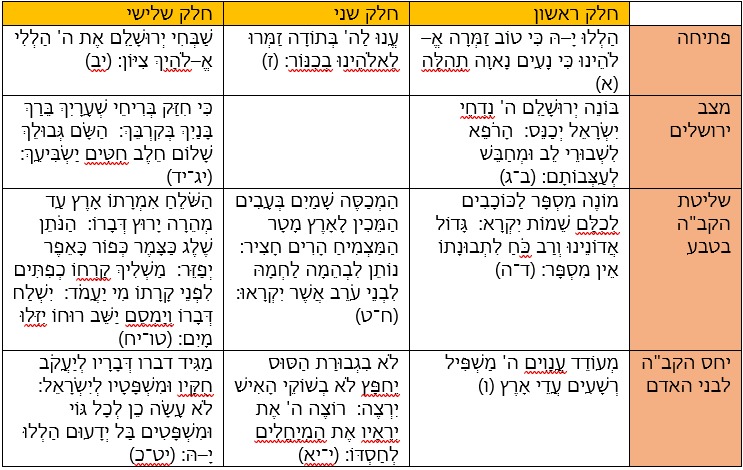Tehillim 147 | "He Had Declared His Words to Yaakov"

In an article from 'Beit Miqra', Dr. Aryeh Strikovsky divides this Psalm into three parts, with each part opening with a command to Hallel (v. 1), to give thanks (v. 7), or to praise (v. 12). These parts are subdivided into four units. After the command to praise, there is a reference to the condition of Jerusalem (only in the first and third parts), followed by a description of God's control over the heavens and nature, and finally, God's relationship with human beings (see accompanying table). In each unit, there is a progression from one section to the next: regarding the command to praise, the first part contains a general call to praise; in the second part, it is clarified that this involves giving thanks with a harp; and finally, it describes that the residents of Jerusalem are those who should praise. Regarding the rebuilding of Jerusalem, there is a progression from a city that the scattered people return to, into a flourishing city. Regarding nature, there is a progression from control over the host of heaven, which has no effect on the world (the stars), to control over rain and food, and finally, to control over disasters like frost and protection from it. A significant change also occurs in relation to human beings: in the first part, there is a general description of God's support for the "humble" and His humbling of the wicked; in the second part, the characteristics of the righteous are detailed in contrast to the wicked; and in the third part, it is sharpened that the righteous are the people of Israel, who merited to receive God's statutes.
The idea in this Psalm is the relationship between nature and God's might in relation to nature, and the human being who merited to receive the Torah. In the third part, the poet compares nature, which receives God's command and fulfils it: "He sends His commands to earth; swiftly runs His words" (v. 15), to the people of Israel, who also merited to receive His statutes from God. (See a similar comparison in Yeshayahu Chapter 55). Throughout the Psalm, the difference is emphasized between nature, which did not receive God's statutes, like animals, which receive their food indiscriminately and without any special demands, and human beings, who also merit to receive blessing from God, but are required to work for it.


This website is constantly being improved. We would appreciate hearing from you. Questions and comments on the classes are welcome, as is help in tagging, categorizing, and creating brief summaries of the classes. Thank you for being part of the Torat Har Etzion community!